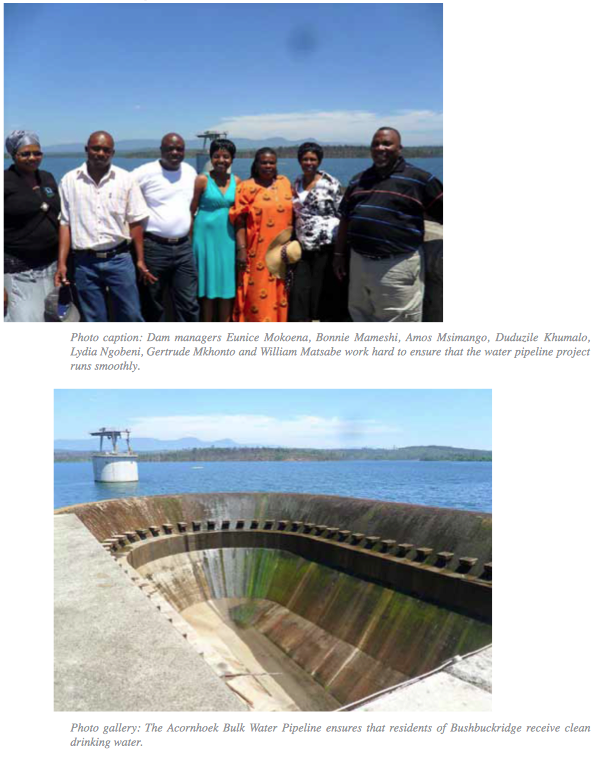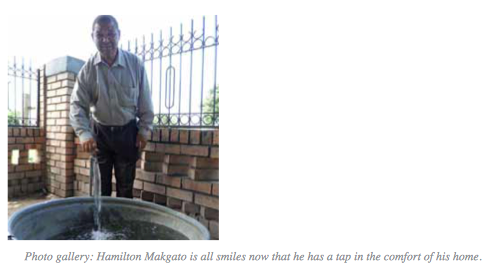Gone are the days when 69-year-old Hamilton Makgato and his family would gather every container and chase after a water tanker or walk for hours to the nearest borehole or river for water. Now all they have to do is open up a tap in their home and water gushes out - making life so much easier for the family.
 Makgato lives with his wife, aunt, two children and three grandchildren in the Shatale village in Bushbuckridge, Mpumalanga. “I used to buy water for my family to drink, cook and bath with. It was so heavy to carry but it had to be done. Now I am so happy because we have a tap in our home,” said an overjoyed Makgato.
Makgato lives with his wife, aunt, two children and three grandchildren in the Shatale village in Bushbuckridge, Mpumalanga. “I used to buy water for my family to drink, cook and bath with. It was so heavy to carry but it had to be done. Now I am so happy because we have a tap in our home,” said an overjoyed Makgato.
The Makgato family are among the more than 264 000 Bushbuckridge residents from villages in Relani, Shatale, Orinico, Casteel, Craigeburn, Tsakani and Acornhoek who will now receive clean, filtered water every day, thanks to the Acornhoek Bulk Water Pipeline Project.
According to the Executive Mayor of Bushbuckridge Local Municipality, Renias Khumalo, the municipality started the project after a severe drought hit the area in 1995. Due to the water shortage, the municipality decided to build the Inyaka Dam and construct the Inyaka Water Treatment Works. However, poor workmanship and quality of materials meant that the pipeline collapsed.
To keep the project afloat, the provincial Department of Water Affairs, through the Regional Bulk Infrastructure Programme, took over the maintenance in January 2010 and injected a whopping R140 million into the project.
The Bushbuckridge Local Municipality is one of the few municipalities in Mpumalanga with huge water supply backlogs. To remedy this, three main bulk supply pipelines have been created. The pipelines that connect to the Marite community in the south east and the Hluvukani community in the north east of Bushbuckridge have been completed and are fully operational. The Dwarsloop to Acornhoek bulk pipeline is the final project to supply water to communities in the north west.
Challenges
The project has encountered challenges that have delayed progress. These include heavy rain and floods in the region in January 2011, community uprisings over service delivery, emergency repairs to reservoirs and repairs to leakages on the pipeline.
To date, residents from the Relani, Shatale, Orinico, Violetbank and Casteel villages are able to receive water from the pipeline. The Craigeburn village is expected to start receiving water by 31 January, the Tsakani village by 28 February and Acornhoek villagers will receive their bulk water supply from March this year.
Treatment
 Villagers will now get clear, filtered and treated water from the pipeline and will not have to rely on dirty, disease-ridden river water. To ensure the water is processed properly, the water from the Inyaka Dam is sent to the Inyaka Water Treatment Works at the Bushbuckridge Water Board. Here the water undergoes a strict process of filtration, disinfection, treatment and waste water is disposed. Once all the impurities have been removed, the water is then sent via the pipeline from the treatment works to the villages and is ready for consumption.
Villagers will now get clear, filtered and treated water from the pipeline and will not have to rely on dirty, disease-ridden river water. To ensure the water is processed properly, the water from the Inyaka Dam is sent to the Inyaka Water Treatment Works at the Bushbuckridge Water Board. Here the water undergoes a strict process of filtration, disinfection, treatment and waste water is disposed. Once all the impurities have been removed, the water is then sent via the pipeline from the treatment works to the villages and is ready for consumption.
The clean water will also help rid the com- munities of health related problems such as diarrhoea and cholera, which are caused by drinking river water that has not been purified.
Sarah Mogakane, the regional manager of the Shatale municipality, said residents were overjoyed to finally receive a stable supply of clean water. “Previously, the municipality could only send out water tankers once or twice a week and the water was not enough to supply all the households. This left the communities no choice but to use river water. Now the pipeline has made a huge impact on the lives of our people. It has changed their lives for the better,” she added.
The bulk infrastructure pipeline will provide water to more than 264 000 people. This includes:
- 10 130 residents in Relani
- 38 410 in Shatale
- 7 468 in Orinico
- 45 771 in Casteel
- 24 273 in Craigeburn
- 38 375 in Tsakani
- 85 194 in Acornhoek.



 Facebook
Facebook Twitter
Twitter WhatsApp
WhatsApp